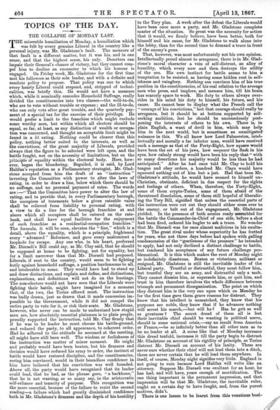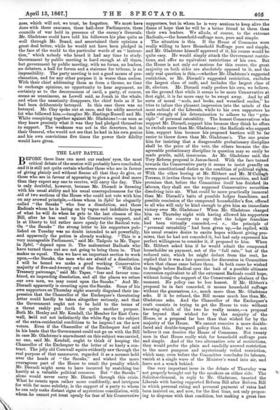TOPICS OF THE DAY.
THE COLT. APSE OF MONDAY LAST.
THE miserable humiliation of Monday, a humiliation which was felt by every genuine Liberal in the country like a personal injury, was Mr. Gladstone's fault. The measure of that fault is a different matter, but it was his, and in one sense, and that the highest sense, his only. Deserters can impair their General's chance of victory, but they cannot com- pel him to decline an encounter to which his honour is engaged. On Friday week, Mr. Gladstone for the first time met his followers as their sole leader, and with a definite and resolute policy to propose. That policy was one to which every hearty Liberal could respond, and, stripped of techni- calities, was briefly this. He would not have a measure which, while it nominally concedes Household Suffrage, really divided the constituencies into two classes—the well-to-do, who are to vote without trouble or expense ; and the ill-to-do, who can only vote after great trouble, and the quarterly pay- ment of a special tax for the exercise of their privilege. He would prefer a limit to the franchise which might exclude some worthy men, but within which all electors should be equal, so far, at least, as any distinction of wealth or occupa- tion was concerned, and thought an acceptable limit might be found in a 5/. rating. Nothing could be clearer than this policy, nothing better suited to the interests, as well as the convictions, of the great majority of Liberals, provided always that the figure to be selected were left open, and the battle fought, not on the necessity of limitations, but on the prinoipre of equality within the electoral body. Here, how- ever, began the blundering. Beguiled, it is said, by Lord Halifax's reputation as a Parliamentary strategist, Mr. Glad- stone accepted from him the draft of an " instruction " investing the Committee with power to alter the laws of rating, in order to draw a line, below which there should be no suffrage, and no personal payment of rates. The words are :—" That the Committee have power to alter the law of rating, and to provide that, in every Parliamentary borough, the occupiers of tenements below a given rateable value shall be relieved from liability to personal rating, with a view to fix a line for the borough franchise at and above which all occupiers shall be entered on the rate- book, and shall have equal facilities for the enjoyment of such franchise as a residential-occupation franchise." The formula, it will be seen, elevates the "line," which is a detail, above the equality, which is a principle, frightened every " advanced " Reformer, and gave every malcontent a loophole for escape. Any one who, in his heart, preferred Mr. Disraeli's Bill could say, as Mr. Clay said, that he should be supposed at home to be fighting, not for equality, but for a limit narrower than that Mr. Disraeli had proposed. Liberals, if sent to the country, would seem to be fighting hotly against household suffrage, a position burdensome to all, and intolerable to some. They would have had to stand up and draw distinctions, and explain and define, and distinctions, explanations, and definitions will not do on the hustings. The non-electors would not have seen that the Liberals were fighting their battle, might have imagined for a moment that, of the two, the Tories offered most. The instruction was badly drawn, just so drawn that it made concession im- possible to the Government, while it did not compel the entire party to vote for it, or risk their seats. Mr. Gladstone, however, who never can be made to understand how stupid men are, how absolutely essential plainness is to plain people, proudly supported the instruction, told Mr. Clay firmly that if he was to be leader he must choose his battle-ground, and reduced the party, to all appearance, to coherent order. Had he adhered to the attitude he assumed at the meeting, all might have still been well. The wisdom or foolishness of the instruction was matter of minor moment. He might and probably would have been beaten, but his firmness and decision would have reduced his army to order, the instinct of battle would have restored discipline, and the constituencies, seeing him convinced, would in their boundless confidence in him have believed that his conviction was well founded.
Above all, the party would have recognized that its leader could lead, that he had, as the phrase goes, "a backbone," that he is not wanting, as so many say, in the aristocratic self-reliance and tenacity of purpose. This recognition was the more essential, because of the failure to resist the second reading—a failure which had greatly diminished confidence both in Mr. Gladstone's firmness and the depth of his hostility
to the Tory plan. A week after the defeat the Liberals would have been once more a party, and Mr. Gladstone complete master of the situation. So great was the necessity for action that it would, we firmly believe, have been better, both for himself and his cause, for Mr. Gladstone to walk alone into, the lobby, than for the second time to demand a truce in front of the enemy's guns.
That, however, was most unfortunately not his own opinion. Intellectually proud almost to arrogance, there is in Mr. Glad- stone's moral character a vein of self-distrust, an alloy of humility, which every now and then destroys the utility of the ore. His own instinct for battle seems to him a temptation to be resisted, as having some hidden root in self- ishness and vainglory. Nothing can convince him of his true position in the constituencies, of his real relation to the average men who press, and implore, and menace him, till his brain_ has scarcely space to work. His duty to others always over-
rides in his mind his duty to himself, his future, and his cause. He cannot bear to display what the French call the "courage of his convictions," lest that courage should really be arrogance, lest it should be at bottom supported by self- seeking ambition, lest he should be unconsciously post- poning the interests of others to his own. There is, in plain English, a want of devil in him, which may help him in the next world, but is sometimes an unmitigated
nuisance in this. We all know how Lord Palmerston, intel- lectually and morally a far inferior man, would have received such a message as that of the Forty-Eight, how square would
have been the set of his jaws, how moquant the flash in his eyes, how calmly strong would have been his reply that" with
so many desertions his majority would be less than he had anticipated." After he had once told Mr. Clay to hold his tongue and obey orders, a hundred Mr. Clays would have squeezed nothing out of him but a jest. Had that been Mr. Gladstone's attitude, he would have seemed to himself un- Christian, obstinate, deficient in due respect for the rights and feelings of others. When, therefore, the Forty-Eight,. some of them crypto-Tories, some of them afraid of the threatened dissolution, some of them still hopeful of liberaliz- ing the Tory Bill, signified that unless the essential parts of the instruction were cut out they should either cross over to the enemy, or bolt out of the engagement, Mr. Gladstone yielded. In the presence of both armies ready asiembled for the battle the Commander-in-Chief of one side, before a shoe had been fired, ordered his bugler to ask a truce. No wonder that Mr. Disraeli was for once almost malicious in his exulta- tion. The great rival under whose superiority he has fretted for years, who not three days before had spoken with galling- condescension of the "gentleness of the pressure" he intended to apply, had not only declined a distinct challenge to battle, but rendered his acceptance of any future challenge pro- blematical. It is this which makes the rout of Monday night. so indefinitely disastrous. Beaten or victorious, militant or resigned, Mr. Gladstone is still the inevitable leader of the Liberal party. Trustful or distrustful, they must follow him, but trustful they are an army, and distrustful only a mob. Theycannot dismiss him, or supersede him, or quit him, and trust in him therefore involves the whole difference between. triumph and permanent disorganization. The point on which they distrust him is the very one upon which on Monday he for the first time gave them grave reasons for distrust. They know that his intellect is unmatched, they know that his purposes are noble, they know that if he advances nothing will arrest his march,—but will he I Has he grit as well as greatness ? The secret dread of them all is lest, their inevitable chief should be wanting in political nerve,. should in some national crisis,—say an insult from America or France,—be so infinitely better than all other men as to be no leader at all. A scene like that of Monday increases this dread tenfold, increases it till the party begin to distrust Mr. Gladstone on account of his rigidity of principle, as Tories distrust Mr. Disraeli on account of his laxity. These are never sure whether their chief will not lead them into a ditch, those are never certain that he will lead them anywhere. In itself, of course, Monday night signifies very little. England is not going to ruin because Lord Halifax will write like an attorney. Suppose Mr. Disraeli was exultant for an hour, he has had, and will have, years enough of mortification. The one thing important is the permanent impression, and that impression will be that Mr. Gladstone, the inevitable ruler, ought on a certain day to have fought, and, from the purest. motives, didn't.
There is one lesson to be learnt from this vexatious busi- ness, which will not, we trust, be forgotten. We must have done with these caucuses, these hall-door Parliaments, these -councils of war held in presence of the enemy's Generals. _Mr. Gladstone could have told his followers his plan quite as well through Mr. Brand, and ascertained their opinions a great deal better, while he would not have been pledged in the face of the world to the particular words of an "instruc- tion," which nobody who heard it had any time to study. Government by public meeting is hard enough at all times, but government by public meeting, with no forms, no leaders, no debaters, a hall for forum and a staircase for tribune, is an impossibility. The party meeting is not a good means of pro- clamation, and for any other purpose it is worse than useless. With their chief addressing them as from a throne, no time to exchange opinions, no opportunity to hear argument, no -certainty as to the decorousness of cavil, a party, of course, seems as unanimous, as Lowell said, as Jonah in the whale, and when the unanimity disappears, the chief feels as if he had been deliberately betrayed. In this case there was no betrayal. Mr. Clay spoke out at once, and the oddly assorted lot who followed him,—imagine Mr. Hastings Russell and Mr. White conspiring together against Mr. Gladstone I—as soon as they knew precisely what it was they had pledged themselves to support. The weakness was not in the deserters, but in their General, who would not see that he had in his own genius And his own convictions five times the power their fidelity would have given.































 Previous page
Previous page